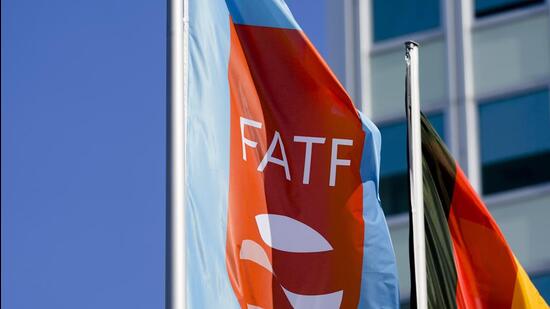On FATF decision to let Pak exit grey list, India outlines what it has achieved
India’s external affairs ministry spokesperson Arindam Bagchi noted that Pakistan will have to continue working with FATF’s Asia Pacific Group (APG) to continue to strengthen its systems
NEW DELHI: The Financial Action Task Force (FATF) on Friday removed Pakistan from its “grey list” after more than four years, though the multilateral watchdog said Islamabad will have continue its work to further improve systems to combat terror financing and money laundering.

FATF placed Pakistan on its list of countries under increased monitoring, or the so-called grey list, in June 2018 for its failure to tackle terror financing, especially the activities of UN-designated terror groups such as Lashkar-e-Taiba (LeT) and Jaish-e-Mohammed (JeM). Pakistan was given two action plans with 34 action items to strengthen its ability to counter both fund-raising by terrorists and money laundering.
At the conclusion of FATF’s two-day plenary meeting in Paris, the body’s president, T Raja Kumar of Singapore, announced at a media briefing that Pakistan was being taken off the grey list in line with a consensus decision by the watchdog’s 39 member countries. The reforms carried out by Islamabad were good for the security and stability of Pakistan and the region, he said.
“That doesn’t mean that there isn’t more work to do. Going forward, Pakistan will need to work with the FATF’s regional partner, the Asia Pacific Group (APG), to continue to strengthen its systems,” Kumar said.
Reacting to the announcement, India’s external affairs ministry spokesperson Arindam Bagchi noted that Pakistan would have to continue working with the APG. “As a result of FATF scrutiny, Pakistan has been forced to take some action against well-known terrorists, including those involved in attacks against the entire international community in Mumbai on 26/11,” he said.
“It is in global interest that the world remains clear that Pakistan must continue to take credible, verifiable, irreversible and sustained action against terrorism and terrorist financing emanating from territories under its control,” he added.
A statement issued by FATF said the body “welcomes Pakistan’s significant progress in improving its AML/CFT [anti-money laundering/counter-financing of terrorism] regime”.
The statement said, “Pakistan has strengthened the effectiveness of its AML/CFT regime and addressed technical deficiencies to meet the commitments of its action plans regarding strategic deficiencies that the FATF identified in June 2018 and June 2021, the latter of which was completed in advance of the deadlines, encompassing 34 action items in total.”
It added, “Pakistan is therefore no longer subject to the FATF’s increased monitoring process. Pakistan will continue to work with APG to further improve its AML/CFT system.”
FATF president Kumar said an onsite inspection by a FATF team that visited Pakistan at the end of August had established that the country had “largely addressed” all of the 34 action items. The first action plan with 27 items focused on terror financing risks, while the second action plan with seven items focused on money laundering.
“The team verified both the sustainability of Pakistan’s reforms and, importantly, its commitment to continue to make improvements into the future. The overall view is that Pakistan has made significant improvements to strengthen the effectiveness of its framework for combating terrorist financing and steps have also been taken to strengthen risk-based supervision of both financial and non-financial institutions as well as improving asset confiscation outcomes and investigating and prosecuting money laundering,” he said.
FATF is also “satisfied that there’s high-level political commitment on the part of the Pakistani authorities to not just implement the current set of action steps that they need to take but they are also committed to ongoing reforms”, he said.
“However, there is still work to be done on their part and I’m encouraging Pakistan to continue to work with the APG, to continue taking steps to combat terrorism financing. All countries are subject to ongoing follow-up and Pakistan will have to keep reporting on their system through these mechanisms,” he added.
Sameer Patil, senior fellow at the Observer Research Foundation (ORF), said a close watch will have to be kept on Pakistan’s efforts to act against terror groups.
“Pakistan may have exited the grey list but that doesn’t mean that it’s support to terrorist activities has disappeared. As we have seen repeatedly in previous instances, the terrorist infrastructure remains intact, while the public display of state support and the activities of terrorist groups may have declined. We will have to see how this pans out,” he said.
Kumar also announced steps by the FATF that he said would effectively “sideline” Russia as a member of the watchdog in view of its aggression in Ukraine. While expressing “deepest sympathies for the needless loss of life, suffering and destruction” due to the Russian invasion of Ukraine, he said: “Russia’s actions continue to violate FATF’s core principles, which aim to promote security, safety and the integrity of the financial system.
“As a result of Russia’s continuing actions, the FATF has decided to impose additional restrictions on the country’s remaining role, including by barring them from participating in current and future FATF projects. Russia is also barred from participating in meetings of the FATF-style regional bodies as an FATF member.”
He also announced the addition of Myanmar to FATF’s “black list”, which earlier had only Iran and North Korea. This, he said, was done because Myanmar had failed to implement an FATF action plan that expired in September 2021.
“Given the continued lack of progress and the majority of its action items still not addressed after a year beyond the action plan deadline, the FATF decided that further action was necessary in line with its procedures and FATF calls on its members and other jurisdictions to apply enhanced due diligence measures proportionate to the risk arising from Myanmar,” an official statement said.





